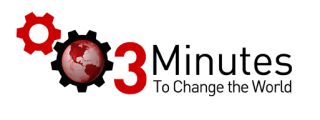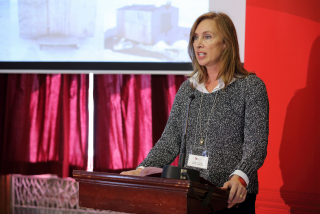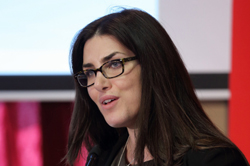
McGill University is very pleased to have hosted 3 Minutes to Change the World on April 2, 2015. We partnered once again with the Canadian Association for Graduate Studies (CAGS) and Universitas 21 (U21) to participate in the second national CAGS Three Minute Thesis (3MT) competition and U21 Three Minute Thesis (3MT) competition.
Graduate students were invited to present their thesis research in three minutes or less as a TED-talk style event. This event is an excellent showcase of the breadth, caliber and impact of McGill’s graduate research and an excellent opportunity for students to share knowledge across disciplines and with the community at large. The presentations are designed for a generalist audience and are recorded and streamed live online. We welcome you to watch the presentations online.

From left to right: Elvis Cao, Dr. Bruce Lennox (Judge), Shufeng Zhou, Elvis Cela, Dr. Ollivier Dyens (Judge), Rhalena Thomas, Stephanie Ballard, Dr. Madhukar Pai (judge), Pierre Lubin, Dayan M. Hochman, Sejal Davla, Dr. Fabrice Labeau (judge), Susanne Havelka and Muhammad Waleed Usman.
During the event, the following judges represented McGill and selected two participants to represent McGill at the national (CAGS) and international (U21) competitions.
- Dr. Olliver Dyens, Deputy Provost Student Life and Learning
- Dr. Bruce Lennox, Professor of Chemistry, Director NSERC CREATE in Neuroengineering, Chair Chemical Institute of Canada
- Dr. Madhukar Pai, Director, McGill Global Health Programs, Associate Director, McGill International TB Centre
Muhammad Waleed Usman, an MSc. Civil Engineering student, was selected to represent McGill at the 3 Minute Thesis Eastern Regional Competition, which took place on May 7, 2015 at Concordia University. The aim of his research work is to develop a vulnerability assessment framework that would become a part of Building code of Pakistan. Vulnerability Curves were the outcome of his 18 month study, which included analyzing more than 800 reinforced concrete frame structures and performing over 800 simulations by varying multiple building parameters (strength of materials used, number of stories and bays, etc.). This curve informs how structural designers create designs for buildings across different areas and seismic zones.
Sejal Davla, a PhD candidate from the Integrated Program in Neuroscience, was selected to participate in the U21 Three Minute Thesis (3MT) competition. Her research topic is concentrated on the structure of astrocytes that connected to neurons in the human brain. Her research is done in the fruit fly laboratory, where she seeks to understand how astrocytes form their shape. Fruit fly astrocytes look similar to humans, which gives us hope that studies with fruit flies can directly be translated to human neurological diseases.
You can watch the 2015 event, featuring the eleven incredible graduate students who showcased their research to other academics and the general public.
 Danielle Dobney
Danielle Dobney
Department of Rehabilitation Science
"Measuring Concussion Symptoms"
 Stephanie Ballard
Stephanie Ballard
Department of Family Medicine
"Towards Identifying Suspected Cases of Elder Abuse in Long-Term Care"

Elvis Cela
Integrated Program in Neuroscience
"Thunderstorms Raging in the Brain:</em> How Abnormal Activity Leads to Epilepsy"
 Elvis (Xiangkun) Cao
Elvis (Xiangkun) Cao
Department of Mining and Materials Engineering
"From Iron Man to Micro Bubbles"
 Sejal Davla
Sejal Davla
Integrated Program in Neuroscience
 Susane Havelka
Susane Havelka
School of Architecture
"The Rise of Self Built, Ephemeral and Mobile Architecture in Canada's Arctic Span"
 Dayan M. Hochman
Dayan M. Hochman
Institute of Air and Space Law
 Pierre Lubin
Pierre Lubin
Department of Integrated Studies in Education
"Smashing Selective Mutism in Haitian Schools"
 Rhalena Thomas
Rhalena Thomas
Department of Neuroscience
"Searching for Molecular Keys to Unlocking Memory Formation"
 Muhammad Waleed Usman
Muhammad Waleed Usman
Department of Civil Engineering
"How Can Vulnerability Curves Save Millions of Lives?"
 Shufeng Zhou
Shufeng Zhou
Department of Experimental Surgery
"A New Era in The Fight Against Cancer"